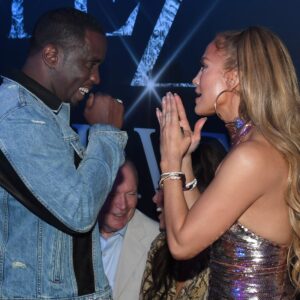The announcement that Puerto Rican superstar Bad Bunny will headline the 2026 Super Bowl halftime show has ignited a heated debate over culture, politics, and entertainment. Bad Bunny’s planned performance, entirely in Spanish and celebrating Latin heritage and social empowerment, has been hailed by fans and diversity advocates as historic. However, critics, particularly from conservative circles, see the move as a political statement rather than a celebration of music. Erika Kirk, widow of conservative activist Charlie Kirk, became a prominent voice in the backlash, calling the decision “a cultural embarrassment” and demanding that the NFL fire the executive responsible for booking him. Her comments have thrust the debate into the national spotlight, highlighting the tension between tradition and inclusion.
Erika Kirk’s objections center on her belief that the Super Bowl should embody unity, faith, and American tradition. She argues that the NFL’s choice represents a deliberate departure from these values, turning a once-unifying event into a platform for political messaging. In her viral post, Kirk emphasized that the halftime show, which has historically brought the country together on game day, is now prioritizing division over celebration. She framed her criticism as defending cultural integrity, rather than opposing language, ethnicity, or individual artists, positioning herself as a guardian of what she views as core American values.
The social media reaction to Kirk’s post was immediate and intense. Hashtags like #SackTheBooker and #SuperBowlSellout trended within hours, reflecting deep polarization among fans. Supporters praised her for speaking boldly about an issue they believe affects national identity and cultural standards, while detractors accused her of stoking outrage and resisting cultural progress. Commentary across platforms highlighted the growing divide over what entertainment events should represent, illustrating how the Super Bowl halftime show has become a flashpoint for broader societal debates about identity, politics, and inclusion.
In response to the criticism, the NFL has remained largely silent, though insiders reportedly dismissed the backlash as predictable but unfounded. Bad Bunny’s camp has also refrained from public comment, signaling a focus on the artistic rather than political aspects of the performance. Nevertheless, petitions demanding the firing of the halftime show’s lead booker have gained significant traction, and some fans have threatened boycotts of the Super Bowl broadcast. This demonstrates how high-profile entertainment events are now arenas where cultural and political conflicts play out in very public ways.
Kirk has sought to clarify her position, emphasizing that her objection is about standards rather than hatred or discrimination. During a livestream, she reiterated that her critique reflects concerns over the commercialization of politics in spaces meant for national unity. By invoking the legacy of her late husband, she framed her activism as a continuation of a conservative mission to influence public culture. Her framing resonates with followers who see her as advocating for a return to more traditional, patriotic expressions in mass entertainment, particularly at events with symbolic significance like the Super Bowl.
The controversy surrounding Bad Bunny’s performance reflects a broader cultural moment in which sports, entertainment, and politics increasingly intersect. Historically, the halftime show has been a site of spectacle and occasional scandal, from wardrobe malfunctions to bold personal statements by performers. Today, however, even song selection and performance style can provoke national debates about values, identity, and inclusivity. Bad Bunny’s prominence as a socially conscious artist has made him a lightning rod for these discussions, while Erika Kirk has emerged as a leading conservative critic. The clash underscores how entertainment events like the Super Bowl have evolved into arenas where culture wars play out, and where differing visions of American identity are contested in real time.





